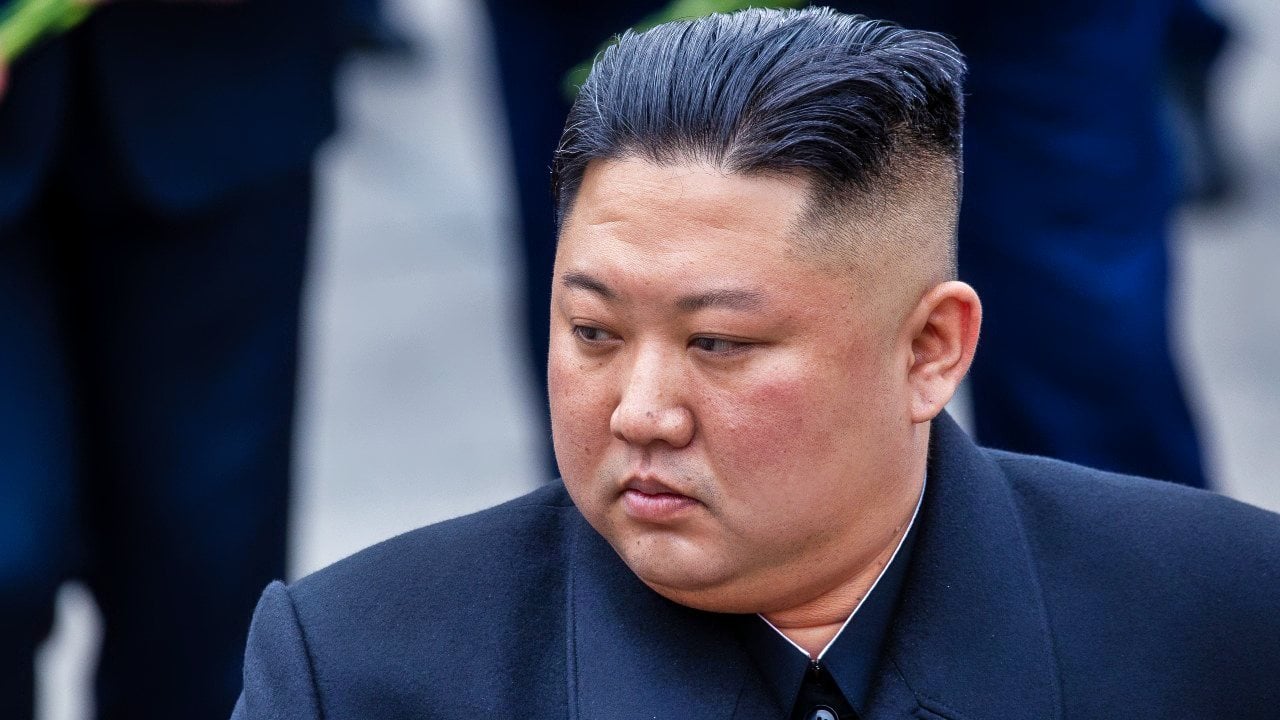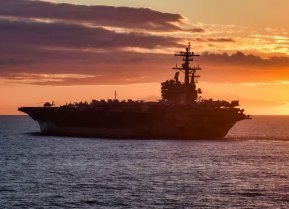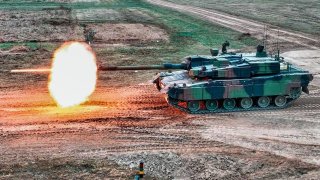Abandoning the U.S.-ROK Alliance Won’t Prevent War
So which country is more important to U.S. national security interests, Taiwan or South Korea? The truth is they both are. The United States must be able to support the defense of both.
Last week, former Trump administration defense official Elbridge Colby suggested that South Korea should take more responsibility for its own defense. “To the extent that we are currently planning on sending massive amounts of forces to Korea that would decrement from our ability to deal with the Chinese, I think we need to revise that. I think we need to have a plan for the defense of South Korea that the U.S. and the president of the U.S. could rationally implement,” he said in an interview with the Yonhap News Agency.
Elbridge Colby and the Korea Question: Refuting the Arguments
While Colby did not specifically advocate for a military withdrawal, his statement alarmed those who seek to prevent war on the Korean peninsula. It unintentionally plays right into Kim Jong-un’s political warfare strategy, which seeks to drive a wedge in the ROK-U.S. alliance and create conditions favorable to coercion and the eventual use of force.
There is speculation that because Colby served in the Trump administration for about one year, these views will dominate a second Trump administration. These statements may also be setting the conditions for increased defense spending from the ROK.
Some of the ideas Colby offered should be challenged. First is the notion that the Korean peninsula is a secondary issue, and the priority for the United States should be deterring China from a takeover of Taiwan. South Korea must, therefore, assume more responsibility for its own defense, and the alliance must conclude the transition of wartime operational control (OPCON) to Seoul as quickly as possible. If U.S. Forces Korea (USFK) does remain in the ROK, it should shift to warfighting against the People’s Liberation Army (PLA). USFK should not be held “hostage” by North Korea, according to Colby.
This begs the question for U.S. policymakers and strategists: Which country is more important to U.S. national security interests: Taiwan or the ROK? While Colby has stated his position that Taiwan’s needs supersede Korea’s, deeper analysis might reveal that they are both important, and neither should be neglected, written off, or left to their own devices, especially if it is in the U.S. interests to deter war against both.
The real challenge, and one that Colby is trying to address, is that to deter war, one must be prepared to fight and win in both places. Unfortunately, making the argument that the United States cannot do both plays into Kim Jong-un’s hands.

Korea as the Secondary Fight
The assumption here is that not only is Taiwan more important to the United States, but that the ROK must be responsible for its own defense. China and North Korea are allies, and it seems that cooperation is deepening between the two (as well as with Russia). It is a mistake to separate the two fights regardless of how much simpler it is for defense planners to do so. The enemy gets a vote, and if one is prioritized, the other may exercise his vote, which creates a huge problem for which we failed to prepare. However, the real mistake in this argument is that publicly prioritizing Taiwan over the ROK will drive a dagger through the heart of the alliance and give Kim room to coerce concessions from the ROK and ultimately use force to unify the peninsula under the Gulag State.
South Korea Should Assume Greater Responsibility for Its Defense
It is not 1950. The U.S. presence is important for deterrence, but it will be ROK soldiers who will do the vast majority of fighting and dying for their country. Yes, the ROK has an advanced military that is superior in technology, doctrine, and training (save for weapons of mass destruction). The ROK allocates a greater percentage of its GDP to defense than most NATO allies. Its defense industry is now one of the best in the world and is supplying advanced weapons and ammunition to like-minded democracies, including Ukraine. The ROK contributes over $1 billion a year to support U.S. troops. The ROK is extremely capable. Nevertheless, it is in the United States and the ROK’s interests to prevent war on the Korean peninsula, and it is the excellent military of the ROK, the commitment of U.S. forces, and extended nuclear deterrence that prevents Kim from attacking. Why give Kim the gift of withdrawal?
OPCON Transition Must be Quickly Concluded
There is an erroneous assumption that the OPCON transition will reduce the requirement for U.S. troops. There are pundits in both the ROK and the United States who believe that the OPCON transition is the first step to a full withdrawal. This current plan for the OPCON transition is that sometime in the future, when the leaders of both countries are satisfied that the military conditions are met, a South Korean general officer will assume command of the ROK-U.S. Combined Forces Command (ROK/U.S. CFC). He will lead the execution of the defense plan that is approved by the Military Committee, which will continue to exercise strategic guidance and control of CFC in the future. There is no known plan for the withdrawal of any U.S. military capabilities when the OPCON transition takes place because the current ROK/U.S. CFC will continue to provide the combined defensive capabilities to deter war and defend the ROK.
US Forces Korea Should Shift to Fight China
USFK is not a warfighting command. It is a sub-unified command of USINDOPACOM. However, like the ROK Joint Chiefs of Staff, it is a force provider to the ROK-U.S. CFC. Other than a rotational ground maneuver brigade combat team, a permanent fires (artillery) brigade, and the Seventh Air Force at Osan and Kunsan air bases, the majority of USFK is focused on providing the backbone communications and intelligence support to the ROK-U.S. CFC as well as the logistics capabilities necessary to sustained U.S. force that will deploy from the United States if the defense plan is executed. Even if all forces from the United States are deployed as planned, the ROK defense capability will be more than six times the size of the U.S. contingent.
Other than the Seventh Air Force, there are very few military capabilities that would be of value in defense of Taiwan. And since the USFK is not a warfighting command, it would be irresponsible to try to employ it as such.
The ROK Should Prepare for A China Fight
Certainly, China is the 600-pound gorilla in the Indo-Pacific, and it is a threat to the ROK. However, to think that the PLA would attack the ROK and North Korea would stay out of the fight is a deadly assumption.
U.S. Forces Should Not be Held Hostage by North Korea
Technically, forces that are apportioned to the defense plan are committed forces and cannot be expected to be employed elsewhere. However, the United States has taken forces from Korea in the past. In 2004, it deployed an entire brigade to Iraq. For the first three years of the Global War on Terrorism, U.S. special operations helicopters rotated to Afghanistan every four months. The real challenge for the defense of both Korea and Taiwan is with “dual apportioned” forces—units that are assigned to support both defense plans based on the (questionable) assumption that both fights will occur simultaneously.
This is the contingency planning that professional defense planners continue to work on. They are considering what capabilities will be available to fight depending on how the war(s) might unfold. Will there be a simultaneous and coordinated attack? Or, if sequential, which one will take place first? This is work that must be done by professionals. But the truth is if the U.S. needs forces from USFK for another contingency, it will deploy those forces. However, as stated, there is little utility in deploying elements of USFK for a Taiwan fight. Again, the USFK is not a warfighting headquarters.
“The United States Should Not Trade Five American Cities for Seoul”
Those who state this fail to understand the nature, objectives, and strategy of the Kim family regime. Curiously, these pundits do not discuss the very real threat posed to American cities by Chinese nuclear weapons. If the argument is that we give up the defense of the ROK to protect American cities, why isn’t the same rationale applied to Taiwan—will conceding the defense of Taiwan result in the safety of American cities from Chinese nuclear attack? The truth is the United States must continue to develop its defense capabilities against nuclear weapons from all threats.
OPCON Transition, Again
Colby is correct in desiring a more rapid OPCON transition. This is because of the outcome of any contingency on the Korean peninsula, whether it is war or instability and regime collapse. Military operations in North Korea should be led by a Korean general, with the U.S. providing support as per the current campaign plan that is in effect at the time. This is to ensure the long-term legitimacy of the end state in any conflict or contingency, which is a free and unified Korea. Koreans must solve the “Korea question” as per paragraph 60 of the Armistice Agreement. The United States also cannot afford the perception that it is leading operations in the north and then acting as an occupier. The ROK military must support the political process led by the ROK government. Again, the United States can play a supporting role in accordance with alliance coordination and approved campaign plans, but a South Korean commander must lead operations.


